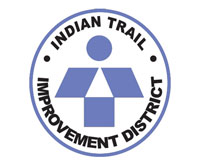The Indian Trail Improvement District Board of Supervisors held its final public hearing on its non-ad valorem assessment rate and proposed 2018-19 budget Wednesday, July 18.
The budget has been whittled down to $11,892,896, which is $88,006 less than last year’s budget, although assessments will go up because no money will be pulled out of reserves to keep them down, according to District Manager Rob Robinson.
ITID President Betty Argue said the district budget is probably one of the most critical duties of the board.
“All the discussions and plans that the direction of the board is giving throughout the year should culminate in a budget, which is your roadmap for what [you] want to accomplish this next year,” Argue said. “It’s still not perfect, but I think that we’re way better than where we started. I really look forward to this coming year being able to hone in on details in identifying a little bit more exactly where each dollar is going.”
Robinson said ITID staff tried to identify lines that were surplus, where the funds had not been spent because they were charged to the wrong accounts.
As a case in point, Robinson said some of the equipment rentals, such as a rock crusher used to make road rock, should have been charged into roads but was under equipment rental.
Highlights of the budget include a 20-year culvert replacement plan, canal improvements, swale and drainage improvements, pump replacements and funding for park equipment replacement.
The budget proposes adding four positions in order to fully staff a six-person culvert replacement and canal maintenance crew.
“With the replacement of the last two that we did — 130th Street and we just finished up Mandarin Blvd. — we had to combine two… crews in order to get this thing done,” Robinson said. “We need a six-man crew in order to get it done effectively. We’re subbing out the paving, but they’re very labor intensive.”
The project cost per year will be $305,000, taking two positions from other areas. The additional cost to the budget will be about $188,000 for the four additional positions.
Drawing largely from funds that went unspent in recent years, Robinson proposed to purchase new equipment, including an F-250 crew truck at $55,000, a 355 excavator at $260,000, a 3-yard loader at $160,000, a dewatering pump at $46,000, a forestry attachment at $29,000, a tractor-trailer truck at $160,000, a lowboy trailer at $75,000 and a demolition dump trailer at $45,000.
Robinson explained that when the crew is not doing culvert replacements, it will be conducting canal bank reclamation, which will require the use of the forestry attachment.
“That would save actually hauling out material, and we would chip it and leave it on the banks, and minimize the burden of taking it out,” Robinson explained. “Several of these items have been previously approved by the board.”
Robinson explained that the demolition dump trailer is for collecting the used culverts for transport to the dump.
Argue pointed out that most of the equipment and additional staff is to fulfill the board’s direction for a 20-year culvert replacement plan.
Robinson said for the two projects they did, Mandarin Blvd. came in at $76,000, and 130th Street, a two-culvert project, cost $78,000.
“If you recall, last year we had a contractor come in to do that double-barrel slip line at 140th Avenue that came in at $224,000. So, we can do it in-house for $80,000 a piece,” he said. “We’ve demonstrated that we can do them in-house. We can do them efficiently, correctly, and for much cheaper than having the contractors come in.”
Another item that the board had directed staff to do was to look at general carryover from previous years, which they found to be $2,336,000, not including the 25 percent reserve fund or utility fund.
That money will be placed into several projects, including road paving, the inverted siphon project, and culvert and canal maintenance, Robinson said.
He added that the inverted siphon underneath the M1 Canal was projected to cost about $1.8 million in 2016. “Right now, we have $800,000 committed to that,” Robinson said.
Capital outlay for asphalt roads has $2 million committed.
Argue pointed out that in the previous two years, the district committed $500,000 a year to road rock replacement, and the new budget commits only $300,000, due to the district producing its own rock.
“We also have a greater need to be replenishing rock, so I’m concerned about lowering this amount, that we’re not going to have what we need to do that rock, and that’s a priority,” Argue said.
ITID Finance Director Bruce Cuningham said the budgeted amount had been reduced because only half had been used the previous year.
“The fact is you don’t need that much money just to do the maintenance portion of the dirt roads, so I moved that money to capital projects, which is going to be the overhaul [of] the dirt roads and repaving of paved roads,” Cuningham said, noting that money had been moved to asphalt road improvements and that he and Robinson agreed that $326,000 for non-asphalt capital and $200,000 for maintenance was sufficient, based on prior years of data.
Supervisor Carol Jacobs asked about the necessity of purchasing some of the equipment, and Robinson said the excavator will replace one that was being rented for $8,000 a month. Jacobs said she did not know where the new equipment would be stored, and that she was also concerned about the quality of rock that the district was producing. However, Robinson said it is the same quality that the district had been purchasing.
Later, at the board’s regular meeting, Supervisor Jennifer Hager made a motion to approve the resolution adopting the non-ad valorem assessment roll, which carried 4-1 with Jacobs opposed.








